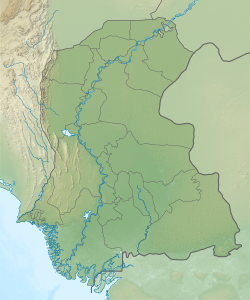Luari Sharif
Luari Sharif
Luari, Lowari | |
|---|---|
 | |
| Coordinates: 24°33′42″N 68°54′07″E / 24.561745°N 68.902034°E[1] | |
| Country | Pakistan |
| Region | Sindh |
| District | Badin |
| Population (2017)[2] | |
| • Total | 9,527 |
| Time zone | UTC+5 (PST) |
| • Summer (DST) | UTC+6 (PDT) |
Luari Sharif, also spelled Lowari,[1] is a town and union council[3] in Shaheed Fazil Rahu taluka of Badin District, Sindh.[4] As of 2017, it has a population of 9,527, in 1,907 households.[2] It is the site of the shrine of Hazrat Khawaja Muhammad Zaman, one of the most revered religious figures in Sindh.[5] The shrine, among the oldest in Sindh, was closed for 37 years due to a custodianship dispute before being reopened in January 2020.[5] This hindered renovation and maintenance of the shrine, which it especially needed after suffering substantial damage during the 2011 Sindh floods.[5] A 2015 attempt by the Auqaf department had been cancelled after tension escalated between the two rival groups, leading to one person being shot and killed.[5] The successful 2020 reopening of the shrine took place without incident, with law enforcement officers on standby, and Auqaf Secretary Munawwar Mahesar unlocked the shrine's main entrance.[5] The shrine is open to women in the mornings and to men in the evenings.[5]
References[edit]
- ^ a b "Geographic Names Search WebApp". Search for "Luari" here.
- ^ a b Population and household detail from block to tehsil level (Badin District) (PDF). 2017. p. 12. Retrieved 24 May 2021.
- ^ "Union Council wise Thematic Analysis". Department of Health, Government of Sindh. Retrieved 24 May 2021.
- ^ "List of Dehs in Sindh" (PDF). Sindh Zameen. Retrieved 24 May 2021.
- ^ a b c d e f Khaskeli, Sawan. "Luari Sharif shrine opened for devotees after 37 years". The Nation. Retrieved 24 May 2021.


